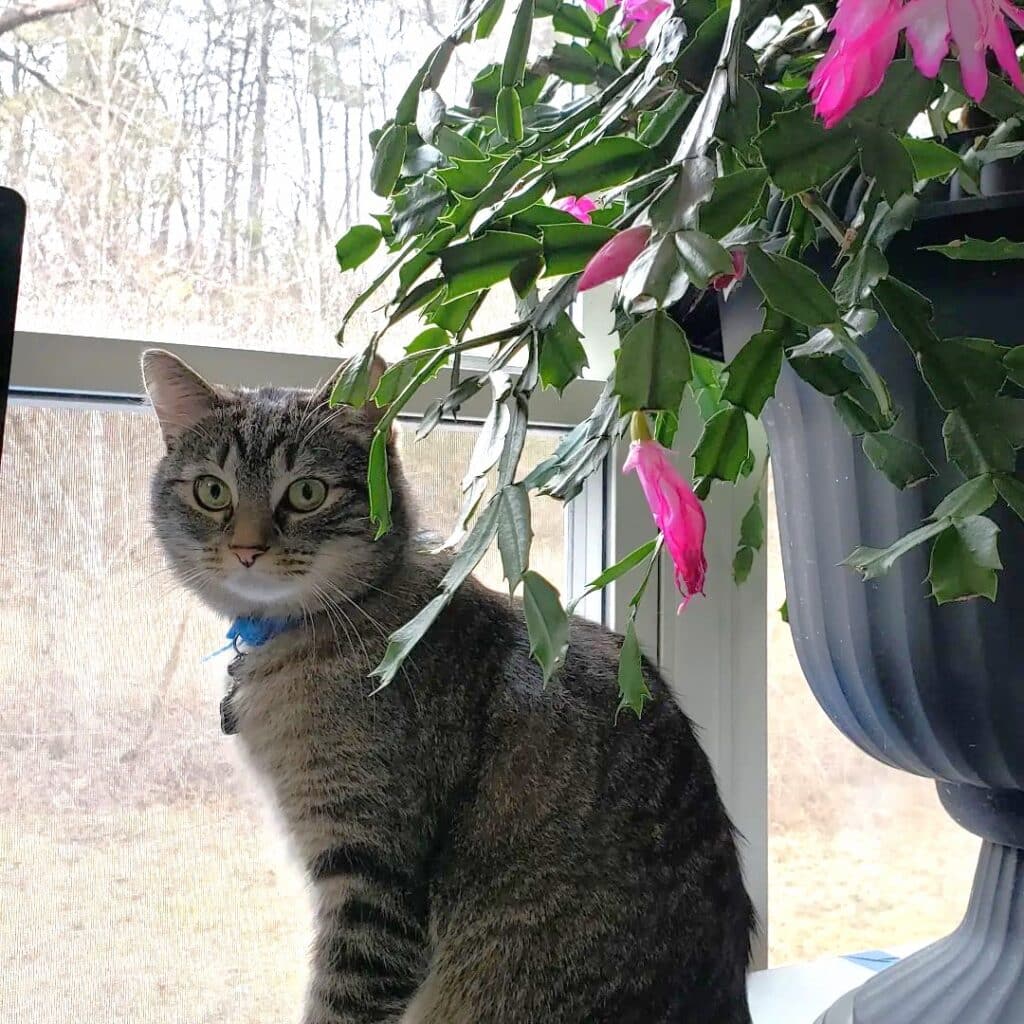Being a pet parent, you might have a fear of thorns simultaneous with the name ‘Cactus,’ but Christmas Cactus is different. Christmas Cactus is not toxic or harmful to your cats.
Unlike you, your fur babies may not be as willing or suited to share their living quarters with the plant. Let’s find it out.
Table of Contents Show
Is Christmas Cactus Toxic to Cats?
Neither the Cactus plant nor its blossoms are dangerous to pets. So, the answer to if our Christmas Cactus is toxic to cats is a no.
However, being non-toxic to dogs, cats, and humans does not mean the same as being unharmful.
Depending on the cat’s consumption amount, you may witness the cat showing signs of abdominal discomfort, followed by diarrhea, vomiting, and nausea.

Additionally, the chemicals in fertilizer and pesticides used to keep your plant healthy may kick in a severe problem for your pets.
The Pet Poison helpline state that chemical poisoning can sometimes cause a change in the color of gum and obstruct normal breathing.
Apart from these reactions, the cat can start choking if it tries to swallow sizeable plant seeds. The seeds may grow up to the size of a small pea.
For these reasons, you may have to think twice about bringing the Christmas Cactus to your home.
Do Cats eat Christmas Cactus?
The inquisitive nature of pets makes them rabble and explore everything around them.
Cats, especially, are more into fringes and dangling objects. And the hanging nature of the Christmas Cactus with vibrant colored flowers drives the cats towards them.
While many believe that cats chew plants for it enjoying the texture and taste, experts have more to say.
Green cross vets state that plants and grass help the cat digest tiny bones and furs from its prey that generally are difficult to pass through the intentional tract.
Basically, the cat may consume the plant to fasten its bowl moment as a laxative.
Ways to Treat Christmas Cactus Allergy
As soon as the plant’s content is out of your cat’s system, the symptoms will typically go away since Christmas Cactus is not poisonous to pets.
Ensure you provide accurate information to your vets regarding the plant’s fertilizers (if used), or contact the hotlines below.
- American Association of Poison Control Centers (AAPCC): (888) 222-1222
- ASPCA Poison Center: (800) 426-4435
With the right medical aid, your furbabies will be ready to gnaw and run again in no time.
How do I Stop my Cat from Eating Christmas Cactus?
The time to take action to protect the plant and the cat is immediately after bringing it to the home.
- Locate the plant out of the cat’s reach: Use hanging baskets or place the plant at a higher height to prevent the cat’s invasion.
- Use barriers: Surround your Christmas Cactus with sharp-leaved or thorny plants like roses and prickly pears, providing a natural barrier to the plant.
- Provide distractions: Cats love fringes and lurking objects. Tie a rope to the door handle to divert your cats’ attention away from the plant.
- Spray cat deterrent: Cats dislike the zesty smell of citrus. Prepare a cat deterrent spray by adding a tablespoon of citrus to a cup of water and then spray it around the plant, or use a commercial cat deterrent to keep your pet away from the plant.
- Keep your cats occupied: Be involved in your cat’s playtime and provide colorful cat toys not to bore them.
- Grow chewable alternatives: To suffice your cat’s green craving, grow cat grass. These alternatives can keep your cat away from munching on Christmas Cactus.
From Editorial Team
With a furry friend around, even the easy nature of Christmas Cactus doesn’t allow you to be carefree.
But you can successfully handle both roles, as a plant enthusiast and a pet lover, by not leaving them unattended together.
Happy Parenting!!


